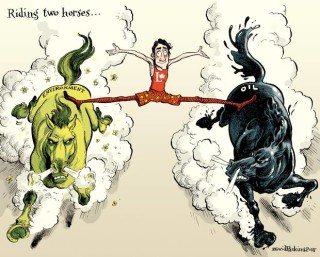This article examines reaction to that decision and provides a basic outline of the university’s position.
Appropriate Subject Area(s):
Environmental studies, world issues, business studies
Key Questions to Explore:
- Why did the University of Toronto reject the recommendation?
- What responsible actions does the institution claim to be taking?
New Terminology:
Divest, governance, social responsibility
Materials Needed:
Copies of the article for group work
Introduction to lesson and task:
There is a growing demand on the part of investors that large organizations and companies demonstrate social responsibility. Investors are increasingly concerned about social issues such as climate change, human exploitation, including child labour, and fair work practices. This concern is such a profile issue that many companies now promote their social responsibility record as a reason for investors to consider becoming involved with them. As millennials become active in investing their influence is starting to dictate corporate action. (Who Are Millennials | Millennial Marketing). High school students are beginning to also demonstrate this focus on social conscience and responsibility, so it is important for them to discuss the issues associated with this emerging factor. This lesson will have the students examine this topic by debating whether or not the University of Toronto failed to show social responsibility when it rejected a recommendation to divest from fossil fuels. Through the use of debate the students will better understand the issues and will develop a clearer understanding of where they, as individuals, stand on the issue.
Action (lesson plan and task):
- Begin the lesson by asking the students to define the term “social responsibility”.
- Once they have a working definition ask them whether, if they were going to invest in a company, would they require that company to demonstrate its social responsibility actions prior to investing?
- Ask them to explain what some of those types of actions would be and, if they do not identify it, ensure that action to address climate change is included in the list.
- Once this has been done explain to them that the University of Toronto just decided to reject a recommendation from its 10-member advisory committee to divest from fossil fuels.
- Provide them with a copy of the article and allow them time to read it.
- Without conducting a discussion, divide the class into two groups – those who support the U of T and those who are critical of the decision.
- Once this has been done, indicate to the students that they are going to be involved in an informal debate of the following resolution:
Be it resolved that the University of Toronto’s decision to reject a recommendation to divest from fossil fuels puts profit over social responsibility and demonstrates a lack of leadership.
- Allow the two sides time to prepare their arguments and then outline the rules of the debate. (Informal Debate)
Consolidation of Learning:
- The two sides will debate the resolution using the previously determined debate rules.
Success Criteria:
The students will:
- Demonstrate an understanding of what is involved in social responsibility.
- Explain some ways in which this responsibility can be demonstrated.
- Outline whether or not social responsibility is an important tissue for them.
Confirming Activity:
- Once the debate has been concluded, conduct a plenary session during which the students can outline the degree to which demonstrated social responsibility will be a determining factor for them in their involvement with any organization or company.

